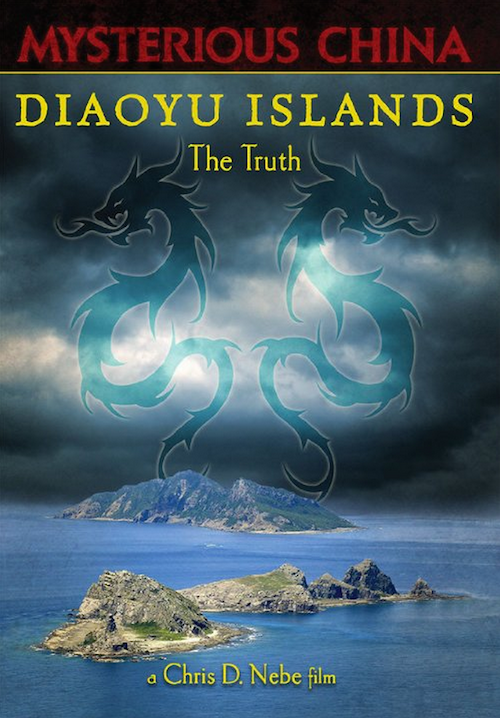Diaoyu Islands - The Truth purports to "provide clarity that is currently escaping the majority of news agencies and Western understanding" about the contested Diaoyu/Senkaku islands in the East China Sea. The 45 minute documentary short was produced by Monarex Hollywood, whose previous work includes Tibet - The Truth and the Mysterious China series of documentaries.
With only 34 foreign films released in China every year, it's rare to see state media focusing on a Hollywood production, let alone a documentary. So it was surprising to say the least to see a cavalcade of articles about a low budget documentary by a little known studio, and yet, between March 12 and March 24, there were (at least) five separate articles published about Diaoyu Islands, as well as several TV spots.
I spoke to director Chris Nebe and producer JJ Osbun about their film, the attention it's received, and whether they are creating documentaries, or propaganda.
THAT'S: How did you get interested in China and involved in making films about the country?
Chris Nebe: Back in the mid-90's I began fostering contacts in the Chinese community just east of Los Angeles. I've always had a love for Asia and its history. In general I appreciate the many cultures of the world, but Asia is special. In the early 2000s I was offered my first chance to make a film in Yunnan and took it. From that point on I worked very hard to make each successive film. My partner JJ Osbun started helping me during post production at film 3, Marco Polo's Roof of the World. He taught himself film production and now the producer of the series. We have a great time together when we film and this is clear in the final product. Our films have heart.
JJ Osbun: I am interested in China because I knew so little about it. My education in the USA was very good. I went to private schools that are very good at educating and still I knew so little about China. When I met Chris in 2006 through a great friend of ours, we both liked each other immediately. Chris and I have similar values that define our characters and both enjoy discovering the world. Making films in China is not a way to become wealthy, but it is very rewarding and, for me, an invaluable set of experiences that will forever benefit my life. I am humbled by the world every time I learn more about it, and that makes me happy.
Where does your funding primarily come from?
Chris Nebe: Funding for political films comes purely from my own pocket. I do not want to be called a propagandist, which the West surely would do if I accepted Chinese financing.
Several of your films focus on countering prevailing Western opinion about various topics (Tibet, Diaoyu), why do you think this is necessary?
JJ Osbun: This is absolutely necessary for the average Western person. The Western people, particularly Americans, do not have a good understanding of world history. They are good people though. This is why we make the films of the Mysterious China Series. When they see our films, they are almost immediately changed in their opinion of China. The most typical response we hear after showing either the Tibet or Diaoyu Islands films is "Oh wow! I never knew this. Why did I not know this? I am shocked." Chris and I enjoy watching this happen over and over, each time we show the films. This is why what we do is necessary - the world needs harmony, but that requires understanding, which is what we offer.
Do you think Westerners are misinformed about China?
JJ Osbun: Absolutely. No question. The Western people are essentially told to fear China and rarely given any information that would allow them to understand the Chinese people correctly. Take the Diaoyu Island dispute as an example. In the West, the media claims that China is trying to take Japanese land. The media and American government only offer a small amount of information about the dispute and claim to be neutral on the issue. The average American citizen thinks the Diaoyu/Senkaku Islands are Japanese. They have no idea that Japan simply took them in 1895 and has refused to hand them back for more than 100 years. After watching our films about Tibet and Diaoyu, Americans change their mind. The biggest problem Monarex has right now is getting more people to see our films in the West. If that happens, rest assured that public opinion in the West will begin to shift in favor of China. Chris Nebe and I both want to see China and the West work together to make our world a better place. We do not believe it is necessary for the West to have an enemy in China, and we know that the Chinese people also feel that way.
You mention that you fund the films yourself to avoid accusations of producing propaganda, how do you respond to accusations that, by echoing the Chinese government line, you are doing just that? Particularly with regard to the glowing coverage your film on the Diaoyus has received in Chinese state media?
JJ Osbun: To be clear, we fund political films by ourselves. Our other films are either commissioned or, again, paid for by us.
Monarex stands by its messages. Propaganda implies that we are misleading our audience. Neither Diaoyu or Tibet are misleading. The facts speak for themselves in both films. I postulate that the Chinese state media appreciates the films because nobody else has bothered to try and see through what, I am sorry to say, is Western propaganda against China.
Do you see anything of a contradiction in producing a film criticising Japanese annexation of the Diaoyus when in the past you've defended Chinese rule of Tibet? 'Diaoyu Islands - The Truth' says that Japanese control of the territory is a legacy of imperialism, but if Tibet has long been an integral part of China as you claim isn't that a legacy of historical Chinese imperialism?
JJ Osbun: Our Tibet film is grounded in history, not in popular culture - namely this ill conceived notion of "Free Tibet." The story of the Dalai Lama is so warped in the West that it has virtually no basis in reality. His message of peace is wonderful and Monarex respects such philosophies greatly, however his omission of the fact that the Tibetan theocracy oppressed many people is malicious and misleads many people. Mao's strong move into Tibet (1959) did not help his image in the West, but the result of China's decision to quash the rebelling upper class helped the vast majority of people in Tibet get out of a life of subjugation.
The older Tibetans we have met remember what life was like in the 50's and earlier, and are very pleased with the major increases in lifestyle that have been afforded to them. Certainly there are socio-economic conflicts playing out as is normal in all societies, but nothing as dramatic as many media outlets would have you believe when they cover monks who self-immolate. Those monks speak for no normal Tibetan, but the lack of cultural understanding from the West has allowed this to become the image of the average Tibetan. This is not true and I'd challenge any reporter to go into the streets of Lhasa and ask normal people walking by if they support such acts.
You asked me if criticizing Japan's annexation of Diaoyutai contradicts our message that Tibet is a part of China based on the concept of imperialism. Absolutely not. The truly autonomous nature of Tibet before 1959 does not negate its evolution as a part of China. The most basic proof I can offer is that Tibet has never been acknowledged by any nation as independent of China.
Additionally, Tibet is one of the most remote places on earth. It would make no sense for a capital city thousands of miles away to rule it directly. Tibet did have representatives of the Chinese dynasty stationed there, but the Tibetan government was given the responsibility of day to day rule. It is pretty similar to a state within the USA.
What Japan did, however, was effectively steal land. There was no intermarriage of royalty, like in Tibet, nor were there centuries of diplomatic developments that brought Japan closer to the Diaoyu Islands. They simply took the islands from China. This cannot be any more clear, yet it is pervasively ignored by Japanese and the United States governments. We plan on changing that with this film. We want the world to ask the right questions of those in power. China was abused greatly by Western and Japanese Imperialism, and few people actually know that.
We believe in peace, not war. The best way we know how to help avoid major political and military fallout between China, Japan and the USA is to educate the world about why these situations matter. Knowledge leads to understanding, and understanding leads to respect. Chris and I both believe China deserves respect after so many decades of being made to look like a villain.
[Image via IMDB]




















0 User Comments